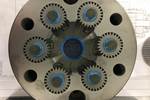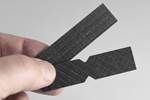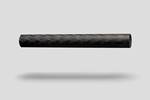Compcut ACS 300 machine provides safety, high performance for U.K. students
Installation of the composite cutting solution at the University of Nottingham has been instrumental in improving academic procedures for PhD students producing test-ready composite samples.
Compcut, a specialist division designing and manufacturing state-of-the-art composite cutting and machining solutions, powered Sharp & Tappin (Holsworthy, U.K.), has provided the University of Nottingham’s (U.K.) Composites Research Group with optimized performance and safety in advanced composite cutting. The university purchased the Compcut ACS 300 in February 2023 to support research funded by the EPSRC Future Composites Manufacturing Research Hub (CIMComp) and has since seen significant improvements to a number of its academic procedures.
Tom Turner, deputy director at EPSRC CIMComp, says the benefits of the ACS 300 were immediately apparent. “The ACS 300 is ideal for providing test-ready samples easily enough that you can leave the machine operating at full efficiency without overseeing the operation,” Turner explains. “The digital interface from which we input commands is a much safer and effective method, teaching PhD students on how to cut composite test samples.”
Before approaching Compcut, the university used a traditional diamond blade plate saw to cut carbon fiber-reinforced epoxy material. This machine required a hands-on approach; composite sheets were manually guided through the blade, increasing the risk of injury and introducing variability to the specimens.
“As soon as we began operating the ACS 300, our time spent recalibrating new parameters was significantly reduced,” Turner notes. “Although our traditional plate saw was effective once configured properly, the quality of the finished cut left much to be desired.”
The ACS 300 is the smallest of Compcut’s range of advanced composite cutting solutions. It offers a 300 × 300-millimeter clear panel size which was ideal for CIMComp’s test specimens, providing highly consistent and accurate parallelism and perpendicularity (down to 0.03 millimeter). Cut test samples from the ACS 300 require no post-processing. Moreover, its quality ensures immediate use of the samples for microscopy, as well as tensile and compressive testing. “Prior to this year, we had to manually polish our plate saw test samples as their edges were frayed,” Turner adds. “The level of finish we now get from the ACS 300 has reduced the time it takes for samples to be sent to the research labs.”
According to Lee Harper, CIMComp manager, “A student can be trained to be proficient on the machine within an hour. Typically undergraduates would not be allowed to use our old machine, due to safety concerns. The enclosed space of the ACS 300 has given more PhD students the opportunity and confidence to cut their own samples and develop their learning.”
The ACS 300 has enabled the university to reduce specimen preparation time by approximately 80%. It is also noted to be much quieter than the old machine, improving the lab’s work environment.

















